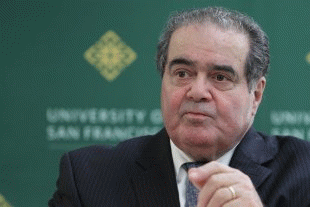Reprinted from Alternet
The death of Supreme Court Associate Justice Antonin Scalia raises a number of questions: What will be Scalia's legacy? What will happen to the cases pending in the Supreme Court? Will President Obama successfully fill Scalia's seat on the high court? And how will Scalia's death affect the 2016 presidential election?
Scalia's Record on the Court
Scalia, who was appointed to the Supreme Court by President Ronald Reagan in 1986, was a radical right-wing ideologue who called himself an "originalist," purporting to interpret the US Constitution the way its framers did. He eschewed the idea that the Constitution is a living document that keeps pace with the times. And when voting to allow capital punishment for crimes committed by juveniles, he rejected the Supreme Court's precedent that the Eighth Amendment's banning of cruel and unusual punishments should be interpreted in light of the "evolving standards of human decency that mark the progress of a maturing society."
Scalia favored unlimited corporate election spending and he wrote that the Second Amendment grants an individual the right to bear arms. He opposed reproductive rights, universal health care, same-sex marriage, affirmative action, voting rights, immigrants' rights, labor rights, LGBT rights and environmental protection. When questioned about his vote to anoint George W. Bush president in Bush v. Gore, Scalia barked, "Get over it."
During the oral arguments in Fisher v. University of Texas, the affirmative action case pending in the high court, Scalia said he was not "impressed by the fact that the University of Texas may have fewer" Black students. He added, "Maybe it ought to have fewer. I don't think it stands to reason that it's a good thing for the University of Texas to admit as many Blacks as possible."
Many of Scalia's opinions demonstrate how out of touch he was with ordinary people. Authoring an opinion that created the right of police officers to chase people without probable cause or reasonable suspicion, Scalia quoted Proverbs: "The wicked flee when no man pursueth." He could not imagine why an innocent young person of color might run when he sees a police officer. And when voting to repeal Miranda rights, Scalia wrote in dissent, "Counsel's presence is not required to tell the suspect that he need not speak. The interrogators can do that." As if a police officer would be looking out for the rights of a suspect.
Scalia opposed televising Supreme Court arguments. He once sanctimoniously declared, "Law is a specialized field, fully comprehensible only to the expert."
The Pending Cases
Several cases to be decided this term have already been argued and the justices have likely voted on them. Opinions are being written. So what will happen now? Even if Obama were to nominate a replacement, he or she would not be confirmed before the current term ends in June.
Cases in which Scalia was assigned to author the majority opinion will probably be set for re-argument next term, which starts in October, hopefully with a new justice. If Scalia was part of a five-justice majority, the court will now be divided 4-4. In cases in which there is no majority, the lower court decision will be "affirmed by an equally divided court." It will create no binding Supreme Court precedent. Some cases may be decided on narrow procedural grounds in order to avoid equally divided rulings.
Nine of the 13 US Courts of Appeals have a majority of judges who were appointed by Democrats. Thus, many cases in which the court is evenly divided and the lower court decision stands will have liberal outcomes.
In Friedrichs v. California Teachers Association, it appeared that public sector unions would lose the right to collect mandatory dues from their members in order to fund collective bargaining. Now it appears the case will result in a tie, leaving the lower court decision in place. That means unions in California and 22 other states would retain their right to collect dues.
Evenwel v. Abbott is a voting rights case. The issue is who should be included when creating voting districts: all who reside in them or only eligible voters? A 4-4 tie would leave the lower court decision in place, which upheld the counting of everybody. People who are not eligible to vote include children, non-citizens, people formerly convicted of felonies and prisoners. With the exception of prisoners, most of these people deemed ineligible to vote live in urban areas that are largely Democratic. As a result, a tie in this case would also have a liberal outcome.
Zubik v. Burwell is a "religious liberty" challenge to a regulation under the Affordable Care Act that requires some employers to provide birth control to women workers if they don't sign a form opting out. The case will be argued next month and the lower courts are divided on the issue. A 4-4 tie would result in no decision. Most lower courts across the country have upheld the "contraceptive mandate."
Whole Woman's Health v. Hellerstedt is perhaps the biggest threat to Roe v. Wade to reach the Supreme Court. Texas imposed onerous restrictions on clinics that perform abortions. If there were a 4-4 tie, the lower court decision would stand, resulting in the closure of most clinics in Texas, but not elsewhere. Where a woman lives would determine whether she could obtain an abortion. Associate Justice Anthony Kennedy might vote with the liberals to overturn the restrictions placed on women's health clinics. But even if Kennedy does not vote with the liberals, Scalia's absence still eliminates a broader risk that previously existed: If Scalia had participated in that decision, the court may well have allowed states to impose restrictions.
(Note: You can view every article as one long page if you sign up as an Advocate Member, or higher).






